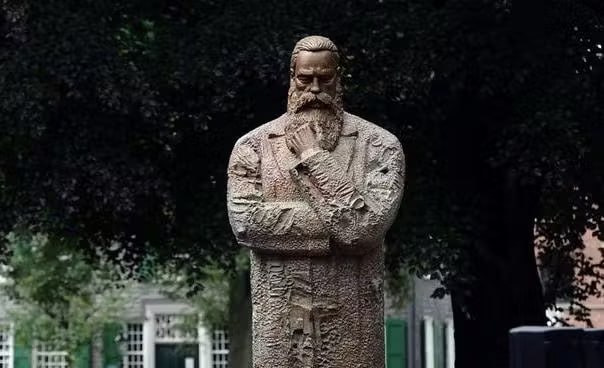Writer; Saeed Amani
Translate from Kurdish; Roman Mireki

170 years earlier, in 1853, Marx wrote a brief but important essay on execution. Of all Marx’s writings, this is probably the only one he wrote specifically on the issue of the death penalty.
Marx’s writing was inspired by an article on executions in the Times of London. Although brief, Marx’s writings very well reflect his views on the issue of execution, the purpose of punishment, and the reasons for opposing it, especially its public conduct. Marx does not seem to have thought of writing such an article on the death penalty at the time of writing.
Marx wrote this essay in London three days after the Times report and published it in the New York Daily Tribune a few weeks later in February 1853. This was written at a time when the death penalty was declining in England. Half of the 19th century under a law that was the basis for the administration of the death penalty until 1815, 220 cases were to be carried out by the end of the 18th century. Most of the crimes are aimed at protecting the private sector of the rich and cracking down on those who encroach on the departments. Theft, fraud, cheating, treason, espionage, etc. were among the crimes punishable by death.
However, the incidence of these punishments declined perceptibly in England during the opening decade of the nineteenth century. In 1861, a significant number of crimes were exempt from the death penalty in a concerted effort, with only five crimes: treason, murder, espionage, arson of the royal shipyard, theft, and piracy facing the death penalty that year.
The Times article and Marx’s reply
Marx begins by referring to the Times report. The Times reports that there is a belief that immediately after the public execution, we will witness a number of deaths by hanging, both suicide and accidental causes. The Times writer attributes this phenomenon to the profound impact of the execution of these criminals on the minds of patients and onlookers. Marx begins his writing by immediately criticizing the Times author, since this behaviour ends up in support of the executioner’s freedom of action and justifies the death penalty as the last demand of society.
Marx continues by referring to a statistic published two days before his article in the Morning Advisory, in which he criticizes the bloody logic of the Times. The figures show the deaths in 43 days in 1849 have been published. According to the statistics themselves, Marx says, As the Times author confirms, the deaths that followed the executions were not only due to suicide, but also included cases of the most brutal murders. It is here that Marx’s main interpretation of his opposition to the death penalty appears. From Marx’s point of view, the death penalty does not prevent the repetition of murder in society, not even in the long run. In this article, Marx points out that historical evidence tells us that since the time of Cain, the death penalty has not only not reformed mankind, but has even had the opposite effect. In this article, Marx raises another important issue. It is generally said that one of the main purposes of the death penalty is for society to learn from the fate of these people. Referring to this issue, that is, what he calls the consequences of reform and intimidation in relation to punishment, Marx asks, By what permission do you give yourselves the right to punish others? The consequences of intimidation through punishment have existed in successive regimes since ancient times and continue to have their own demands.
It is clear that Marx sees the main principle of this issue elsewhere and avoids misinterpretations. In this article, he attacks German ideology, which elevates the position of the criminal to the level of free will, thus taking into account the criminal’s dependence on society and socio economic issues, by quoting a quote from Hegel it doesn’t hold. A question that later became the main subject of Marxist criminology.
A look at the question of Marxist jurisprudence, Marx was a law student and his father was a lawyer. However, there is little concise and structured theme on the question of rights among Marx’s works. Therefore, the fundamental question of rights in Marx’s philosophy must be read through his thoughts and views. For Marx, the main cause of all that is called the infrastructure of society is the facts of life and the relations that are the product of socio economic compromise. These are the factors that define people’s intellectual life, consciousness, moral conflicts, social values, the legal system and the nature of rights and freedoms.
A famous quote from Marx in German ideology says that sometimes it is not man who determines life, but his life and reality that shapes people’s consciousness. From this perspective, human rights and all the laws defined in this field must be the product of history and the struggle for which they have been struggled. No specific framework of rights or freedoms can be defined naturally and predetermined. According to the guidelines of classical Marxism, the only fundamental truth that the whole of human society has faced is the material condition in which human beings have been since the beginning. There were no preconceived ideas for people who found each other in a naked society without culture, morality and social values. According to Luke Pruter the author of Althusser’s thoughts, from the materialist point of view, it is misleading to say that people have mental characteristics that are related to each of us as human beings, such as individual status, rights, freedom, humanity, promises.
Thus, no natural or personal rights can exist. All the rights and freedoms we recognize and defend today, even the most fundamental of which is the right to life, are the product of struggle in the course of history and retreat from structures based on repression and power. The right to life and the abolition of the death penalty cannot be excluded. Today we recognize the right to life as the most fundamental right, meaning that other rights and freedoms are influenced by this basic right. But is that always the case? For example, how can the right to life be discussed in a slave society?
On the other hand, the adoption of the right to life in the sense we know it today was the product of the Enlightenment and the dispelling of the ideas that dedicated human souls and lives to God. Therefore, the formation of the right to life is a purely objective and historical matter and cannot be associated with any other foreign meaning such as human dignity. Returning to Marx’s evidence against the death penalty, we see that Marx made no mention of human dignity or such terms. While he is particularly familiar with the use of the term human dignity, he refers to it in this article where he goes back to Kant’s view.
On the other hand, from Marx’s point of view, those who advocate the death penalty cannot answer the fundamental question: Why should society and criminals gain experience in killing criminals?
Crime is a social phenomenon and the product of a society in which it has developed. But instead of taking responsibility, society tries to show that it has fulfilled its duty by killing the perpetrator. The crime did not occur in a vacuum and the perpetrator did not have an independent will. The rejection of secondary interpretations seems to be the most important guideline of Marxist criminology not only in the interpretation of crimes punishable by death, but also in the discussion of other crimes.
Now in Iran under the rule of the Islamic Republic, we see that a criminal and inhuman act is being carried out openly and without respect for human life in the name of the death penalty. The excuse of this criminal and murderous regime is that it executes its political opponents and others for various other reasons, and in various ways, in order to become a lesson for others. As mentioned in the article itself, these judgments had the opposite effect in the past and the perpetrators could not achieve their goals, as they do today. Therefore, the Islamic Republic will certainly never be able to achieve any significant consequences from this brutal act, and on the contrary, it will turn against itself very strongly and push it towards death and extinction like previous dictatorial regimes.

